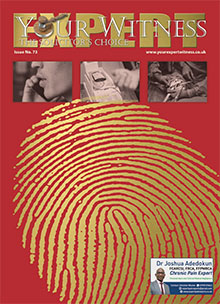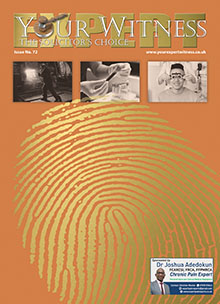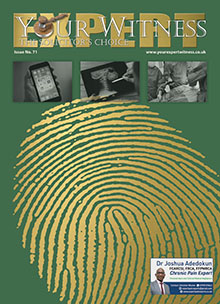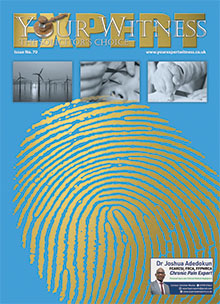IN THE UNITED Kingdom all serious and fatal road incidents are initially investigated by the police service. Invariably, that is the only agency that fulfils the role of attending and investigating at the time of the incident. For this purpose the police service employs qualified accident investigators – also known as Reconstructionists – who have been specially trained and who have many years experience in dealing with road traffic accidents.
Disclosure rules require the police to release all relevant data and evidence gathered during the course of their investigations. However, the analysis of this evidence and data can be complex, and instructing an accident investigator becomes necessary.
It is not the role of the accident investigator to apportion blame; that is for the courts to determine. The investigator’s role is to record or analyse all the scene evidence and to interpret those findings where they would be outside the normal understanding of the court, or to assist the court where appropriate.
An expert witness should be instructed only in matters where that expert has the knowledge, experience, expertise, qualifications or professional training appropriate for the assignment.
Range of skills
The criteria for identifying an expert are difficult to describe. The analysis of the evidence requires a broad range of skills and experience. The overriding rule is that any comment or opinion must be within that person’s limit with regard to his specialist knowledge and expertise.
Rarely is a road accident due to mechanical failure. The most common factors are driver error or some other event. The percentage of accidents caused by human error is normally quoted as over 90%.
No one-specialist field, such as mechanical engineering, can claim the exclusive designation of accident investigator or Reconstructionist. Human behaviour and psychology, road layout and numerous other factors have to be considered, and all require various levels of practical experience and knowledge.
The main constraint is that the expert is competent within the remit of the investigation, recognises his or her own level of expertise and has sufficient ability competently to carry out an analysis of the facts and provide a reasoned explanation of their findings. At all times, the investigator must remain impartial as he or she is independent, no matter who is instructing, and is simply acting on behalf of the court.
Basic techniques
It has long been recognised that marks on the road surface, damage and positions of vehicles or other objects can, with careful analysis, give a reasonably accurate explanation as to what actually happened during an accident.
Most of the basic techniques used in accident investigation are based on the definitions of acceleration and velocity together with Newton’s three laws of motion. Use of these simple definitions allows the derivation of a wide range of equations and methods.
It is not an exact science, but careful application of the various techniques and principles can give good results.
It is folly to assume data where no actual evidence is available to validate any conclusions. However, there may be times when an accident investigator’s level of expertise can allow the use of a range of values to inform the court of the most likely scenario where no other evidence is available The skill of the investigator is in comprehending the evidence and determining the accuracy or otherwise of any conclusions.
Within the UK, the Institute of Traffic Accident Investigators, founded in 1988, is the professional body which represents specialist road accident investigators. Its membership includes forensic scientists, academics, specialist police officers, consultant investigators, engineers, vehicle assessors, lawyers, doctors and others. The overseas membership has representatives from across the world.
The institute is recognised by ACPO, CRFP and other agencies as the leading body in the specialist field of road accident investigation in the UK. The aim of the institute is to promote the free and open exchange of knowledge between those involved in the field of investigating road traffic accidents, and through this to enhance expertise. As a registered charity, the institute provides a forum for communication, education, representation and regulation in its specialist field.
Discipline panel
The ITAI is committed to promoting a professional approach to traffic accident investigation by encouraging honesty and integrity among investigators. This is enforced through a disciplinary procedure, administered by a discipline panel, in order to ensure the highest levels of professionalism among the membership.
The institute aims to represent the interests of the profession in a collective way by arranging field days, lectures, seminars and other educational forums.
To attain member status, an individual must have a minimum of five years specialist experience in the field of accident investigation. This allows an individual the opportunity to attain skills and a level of experience acceptable to the professional body to qualify for expert status.
They must also have attained qualifications that are recognised and pertinent to their specialist field. The individual’s case work and knowledge level is then assessed by specialist assessors before being accredited as a member.



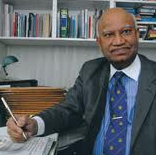 “Speculate before you accumulate. I am a long term regular writer and advertiser in 'Your Expert Witness - the Solicitor’s Choice'. This investment pays me substantive dividends; I get more Expert Witness work with every issue. Not only solicitors and barristers but also judges seem to read it. It is a win-win situation. Success breeds success; I must continue to write and advertise.”
“Speculate before you accumulate. I am a long term regular writer and advertiser in 'Your Expert Witness - the Solicitor’s Choice'. This investment pays me substantive dividends; I get more Expert Witness work with every issue. Not only solicitors and barristers but also judges seem to read it. It is a win-win situation. Success breeds success; I must continue to write and advertise.”












